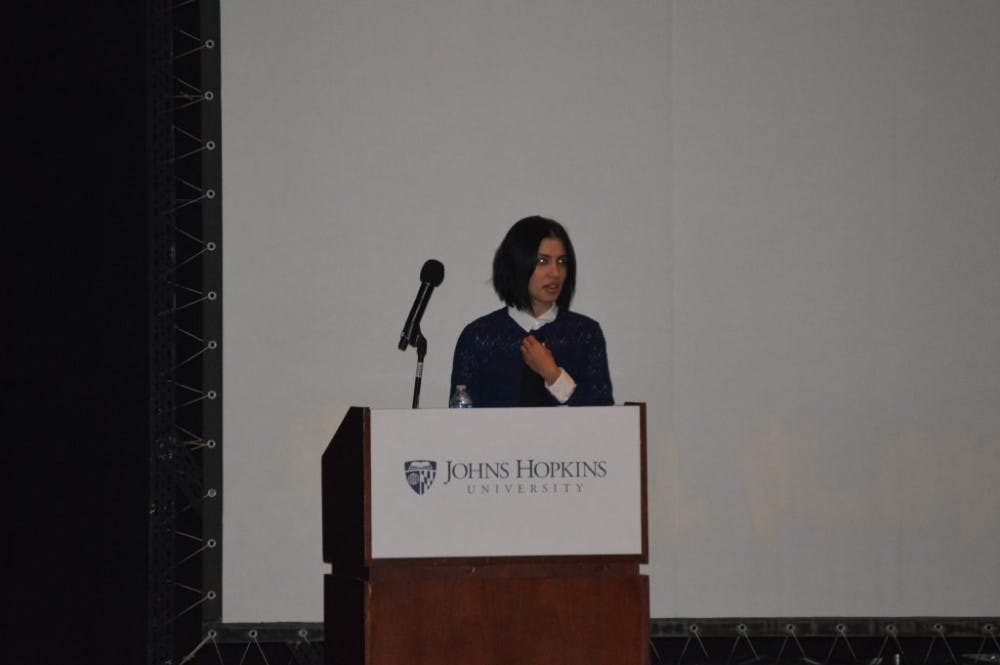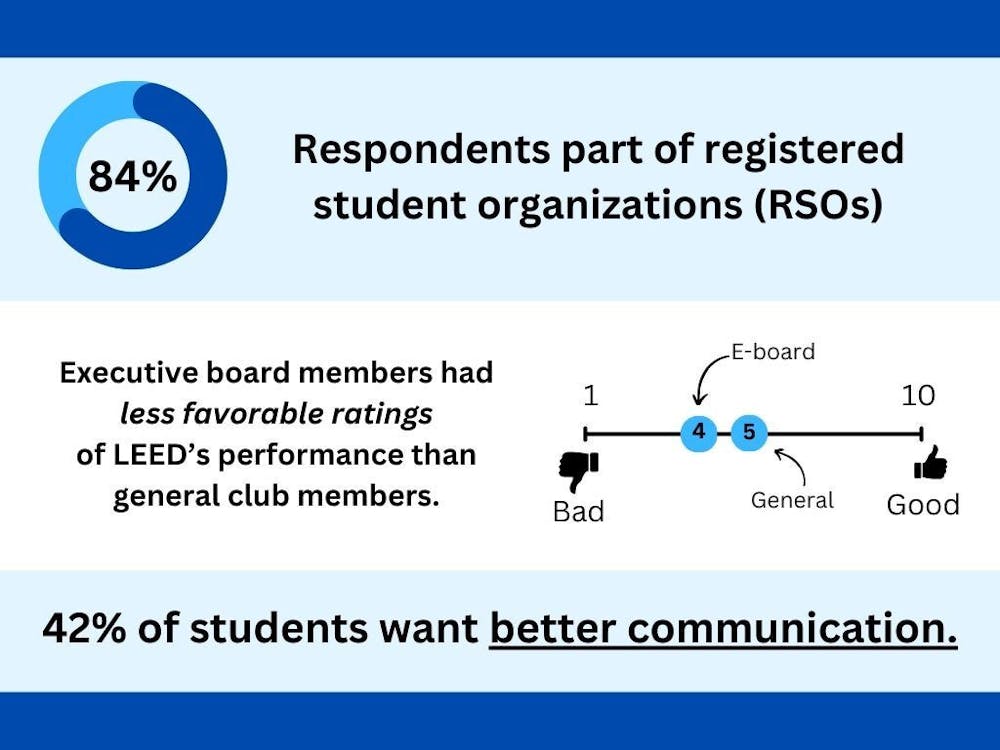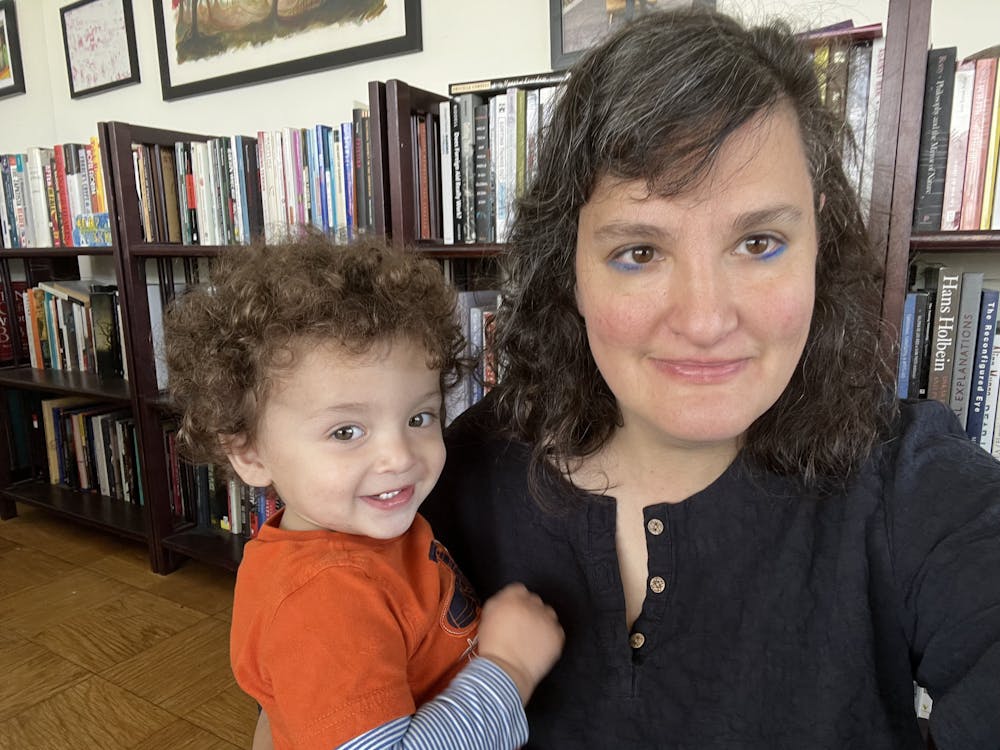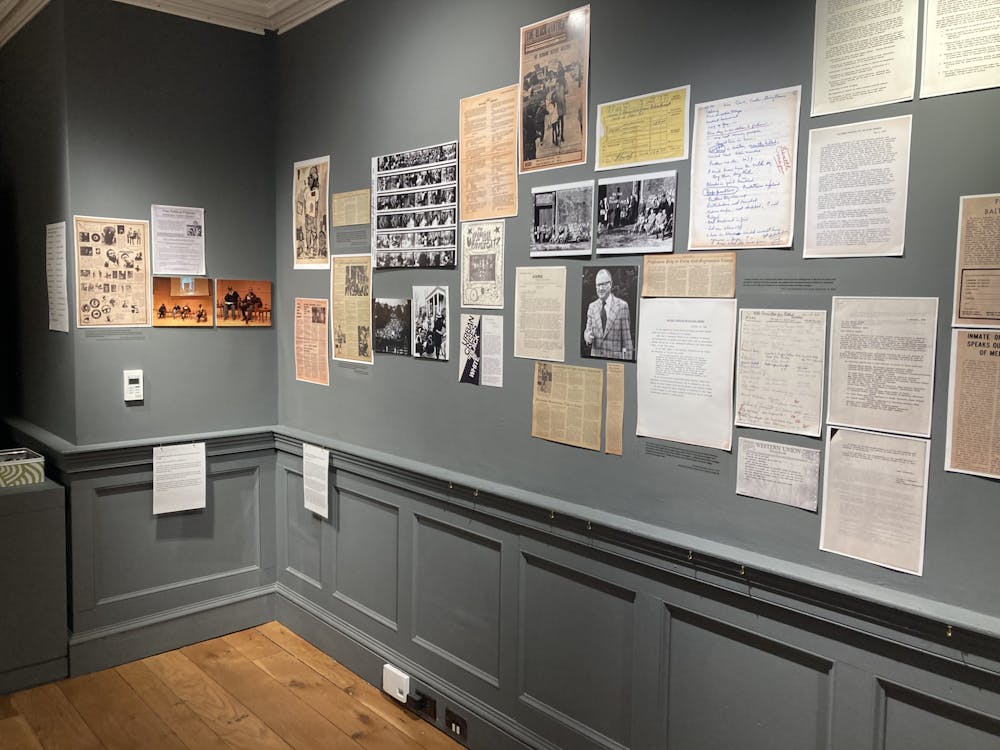Nadya Tolokonnikova, social activist and co-founder of the Russian punk rock protest group Pussy Riot, spoke at Shriver Hall on Wednesday. It was the first Foreign Affairs Symposium (FAS) event for this semester.
Tolokonnikova, a radical feminist and opponent of Russian President Vladimir Putin, was imprisoned for two years after performing a protest song at Moscow’s Cathedral of Christ the Savior in 2012. Her talk focused extensively on President Donald Trump and his rise to power, discussing her own experiences under Putin’s leadership and the importance of mass resistance.
Tolokonnikova was very forward about her dislike for Trump.
“When I’m saying the whole world is in deep sh*t, I don’t think I’m overreacting,” she said.
Responding to those who have accused her of being “hysterical,” she stated that this in itself was a sexist criticism.
“This word hysteria is often used for women,” she said. “Every time women raise their voice and raise their hand and ask to protest, people say, ‘Oh she just has hysterics.’ That’s what they’re trying to say about us, about activists who try to de-naturalize what is going on.”
The event opened with one of Pussy Riot’s recent music videos, titled “Make America Great Again.” The video was released prior to the 2016 elections and featured her visions of a Trump presidency, including the objectification of women.
“We wrote this song in April, and we shot this video on the first of May,” she said. “I remember having conversations with my American cooperators, who said, ‘It is too heavy. You are too radical. Just chill, chillax. It will not be that bad. We do not have any evidence so far on Trump’s sexual harassment.’”
Though dubbed a “political fortune teller” by her cooperators after the infamous 2005 tapes featuring Trump and Billy Bush were released, Tolokonnikova admitted she was initially stunned upon learning the election results.
“It felt like when you get drunk and had sex with your best friend, and the next morning you feel ashamed and you’re trying not to look each other in the eyes and going ‘It’s okay,’” she said. “It was weird.”
She was able to move beyond this initial reaction, however, by deciding to work harder on addressing political issues and keeping herself informed.
“I started to read books on political science, which I hadn’t read for a long time,” she said. “I used to go, ‘Oh no, I’m too busy with my art.’ But now it’s not even a question of if you want to read it or not. It’s a duty now.”

A recurring topic in Tolokonnikova’s speech was how to cope with a Trump presidency and political oppression in general.
“The first thing is, don’t panic,” she said. “Even total disasters could teach you some important lessons. Yes, you’re stuck with Trump and that does suck, but now is the time for radical political analyses.”
Tolokonnikova emphasized that Trump’s presidency can serve as a catalyst for greater change.
“Now we can take a closer look, and ask how it is possible that so many in our society are treated as disposables based on their class, sex and religion,” she said.
She also emphasized the importance of focusing on marginalized groups targeted under a Trump presidency.
“A very good trick that helped me in prison was to think beyond yourself,” she said. “A lot of people would ask me: How would I survive a Trump presidency? I think this question is morally wrong at its core. Think about those who are most vulnerable, who are going to suffer most from Trump’s presidency. Think about ways to help them, and you realize this will actually help you.”
Discussing Trump’s rise to power, Tolokonnikova blamed weak leadership in the Democratic party as well as Trump’s strategy of adopting progressive ideas in an appeal to poorer, unemployed U.S. citizens.
“They take our language and our rhetoric and use it in their own goals,” she said. “Trump is so brilliant at stealing back our words and our message. Now it’s our turn to take back our words and take back our streets.”
While she continuously made comparisons between Trump and Putin and their reliance upon nativism and populism, she commented on how the two leaders are not as similar as some perceive.
“People want to see a lot of similarities between Russia and the U.S., and Putin and Trump, but in fact they are pretty different,” she said. “Trump is inspired by Putin, and he’s Putin’s ally, but he’s different.”
Her talk was followed by a half-hour question and answer session and a reception where she took photos with fans and signed autographs.
Students had the opportunity to ask questions without the presence of a moderator. Sophomore Danielle Yuhan, a graphic designer on the FAS marketing committee, felt that this was one of the features of the talk that set Tolokonnikova’s apart from the average FAS speaker.
“It was actually her idea to do the question and answer in that style, because she wanted to hear questions directly from the people,” Yuhan said. “A lot of speakers don’t do that.”
Attendees such as freshman Nicole Muehleisen felt that overall the event was unconventional.
“I didn’t think she would answer questions for that long,” she said. “But it was really nice how open she was to everything. I didn’t know what to expect, but I liked her charisma and her attitude.”
Freshman Preethi Gopal, who was not very familiar with Tolokonnikova’s work, expressed surprise at her colloquial way of speaking.
“The style was not what I was expecting,” Gopal said. “She’s very candid and spoke whatever came to her mind, which was cool. It didn’t seem she had very much to hide which is different from the politics I have experienced before.
Yuhan felt that Tolokonnikova’s appeal was rooted in her approachability.
“I feel like she’s somebody who is really easy to talk to,” she said. “I get that with other speakers it can be quite intimidating because you feel like there is a barrier between the both of you.”
Yuhan said that Tolokonnikova’s approachable nature and willingness to hear the opinions of others is what made her such a dynamic speaker.
“But she’s somebody who is young like us Hopkins students so you could just go up to her and ask her questions and she knows what you’re talking about,” Yuhan said. “I think it’s really great that she always wants to not only talk about herself but also hear about opinions and ideas from other people.”
















Please note All comments are eligible for publication in The News-Letter.